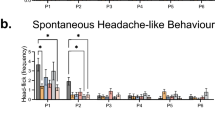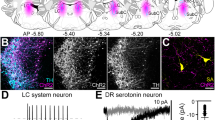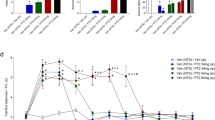Abstract
Antipsychotic or neuroleptic drugs, which block central dopamine receptors, produce a behavioural state in animals in which they fail to correct externally imposed postures. This is referred to as catalepsy. Previous lesion studies have shown that the dopamine receptors in the striatum are involved in this neuroleptic-induced catalepsy1–5. Dopamine receptors, identified by the specific, high-affinity binding of the potent neuroleptic haloperiodol, have been shown to be equally distributed postsynaptically on striatal neurones and presynaptically on cortico-striatal terminals6–9. Because the electrolytic lesioning studies1–5 have unavoidably damaged both pre- and post-synaptic striatal dopamine receptors, it is not known whether these two receptors are separately involved in neuroleptic-induced catalepsy. Using kainic acid and cortical ablation to destroy postsynaptic and presynaptic dopamine receptors, respectively6–9, the present study demonstrates that the cataleptic effects of haloperidol are apparently mediated by dopamine receptors localised postsynaptically on striatal neurones.
This is a preview of subscription content, access via your institution
Access options
Subscribe to this journal
Receive 51 print issues and online access
$199.00 per year
only $3.90 per issue
Buy this article
- Purchase on Springer Link
- Instant access to full article PDF
Prices may be subject to local taxes which are calculated during checkout
Similar content being viewed by others
References
Arushanian, E. B. Adv. Pharmac. Ther. 5, 107–116 (1978).
Costall, B. & Olley, J. E. Neuropharmacology 10, 297–306 (1971).
Fog, R., Randrup, A. & Pakkenberg, H. Psychopharmacology 18, 346–356 (1970).
Honma, T. & Fukushima, H. Jap. J. Pharmac. 28, 231–238 (1978).
Koffer, K. B., Berney, S. & Hornykiewicz, O. Eur. J. Pharmac. 47, 81–86 (1978).
Creese, I., Usdin, T. & Snyder, S. H. Nature 278, 577–578 (1979).
Garau, L., Govoni, S., Stefanini, E., Trabucci, M. & Spano, P. F. Life Sci. 23, 1745–1750 (1978).
Govani, S. et al. Neurosci. Lett. 8, 207–210 (1978).
Schwarcz, R., Creese, I., Coyle, J. T. & Snyder, S. H. Nature 271, 765–768 (1978).
Mason, S. T., Sanberg, P. R. & Fibiger, H. C. Science 201, 352–355 (1978).
Sanberg, P. R., Pisa, M. & Fibiger, H. C. Pharmac. Biochem. Behav. 10, 137–144 (1979).
Ben-Ari, Y. et al. Eur. J. Pharmac. 52, 419–420 (1978).
Ben-Ari, Y., Tremblay, E., Ottersen, O. P. & Naquet, R. Brain. Res. 165, 362–365 (1979).
Coyle, J. T. & Schwarcz, R. Nature 263, 244–246 (1976).
McGeer, E. G. & McGeer, P. L. Nature 263, 517–519 (1976).
Siegel, S. Nonparametric Statistics for Behavioral Sciences (McGraw-Hill, New York, 1956).
Author information
Authors and Affiliations
Rights and permissions
About this article
Cite this article
Sanberg, P. Haloperidol-induced catalepsy is mediated by postsynaptic dopamine receptors. Nature 284, 472–473 (1980). https://doi.org/10.1038/284472a0
Received:
Accepted:
Issue Date:
DOI: https://doi.org/10.1038/284472a0
This article is cited by
-
Animal models of Parkinson’s disease: bridging the gap between disease hallmarks and research questions
Translational Neurodegeneration (2023)
-
Sex Differences in Rats with the Valproate Model of Autism: Disturbances in Social Behavior and Changes in Drd1 Gene Expression in Various Brain Structures
Neuroscience and Behavioral Physiology (2023)
-
Hydro-ethanol extract of Holarrhena floribunda stem bark exhibits anti-anaphylactic and anti-oedematogenic effects in murine models of acute inflammation
BMC Complementary Medicine and Therapies (2022)
-
Dopamine Neuron Challenge Test for early detection of Parkinson’s disease
npj Parkinson's Disease (2021)
-
Dopamine D2 receptors in the expression and extinction of contextual and cued conditioned fear in rats
Experimental Brain Research (2021)
Comments
By submitting a comment you agree to abide by our Terms and Community Guidelines. If you find something abusive or that does not comply with our terms or guidelines please flag it as inappropriate.



